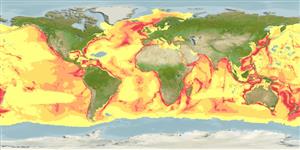Common names from other countries
Classification / Names / Names
Common names | Synonyms | Catalog of Fishes (gen., sp.) | ITIS | CoL | WoRMS
Environment: milieu / climate zone / depth range / distribution range
Ecology
Pelagic; oceanodromous (Ref. 75906); brackish; depth range 0 - 3510 m (Ref. 116169). Tropical; 13°C - 28°C (Ref. 75906); 90°N - 90°S, 180°W - 180°E
Atlantic, the Mediterranean, Indo-Pacific and the Antarctic. Tropical to temperate.
Length at first maturity / Size / Weight / Age
Maturity: Lm ? range ? - ? cm Max length : 380 cm TL male/unsexed; (Ref. 1394); max. published weight: 500.0 kg (Ref. 1394)
Inhabits deep oceanic and continental slope waters of the tropics through the temperate regions in both hemispheres. Feeds os (Ref. 1394). Feeds in deeper waters (Ref. 122680) on crustaceans and cephalopods, but prefers squid (Ref. 1394).
Life cycle and mating behavior
Maturity | Reproduction | Spawning | Eggs | Fecundity | Larvae
Breeding is year-round.
Tan, J.M.L. 1995. (Ref. 936)
IUCN Red List Status (Ref. 130435)
CITES status (Ref. 108899)
Human uses
Fisheries: commercial
FAO - Fisheries: landings, species profile | FishSource | Sea Around Us
Tools
Internet sources
Estimates based on models
Preferred temperature
(Ref.
115969): 4.2 - 15.7, mean 8.7 (based on 2801 cells).
Resilience
High, minimum population doubling time less than 15 months (K=0.49-0.57; tm=11).
Vulnerability
Moderate vulnerability (41 of 100).
Price category
Unknown.
